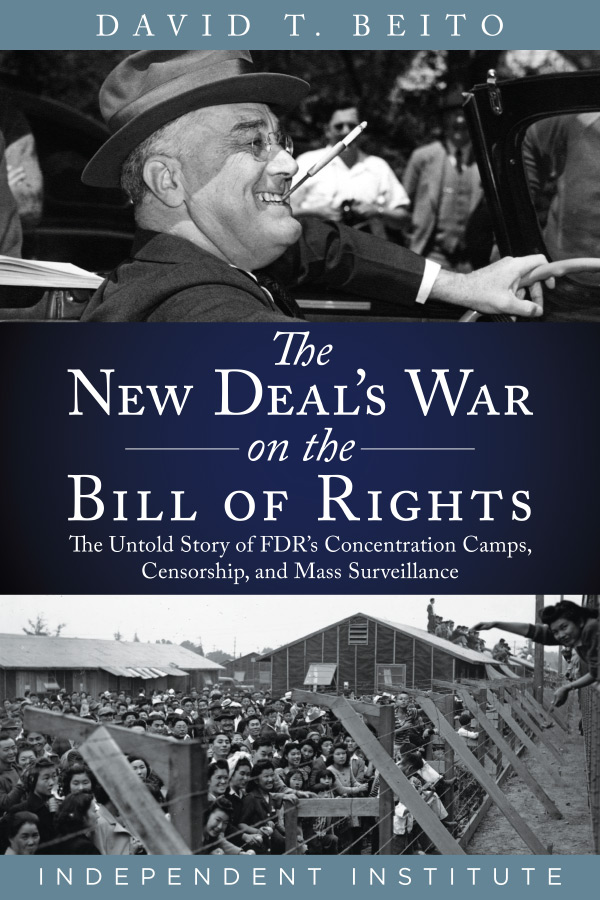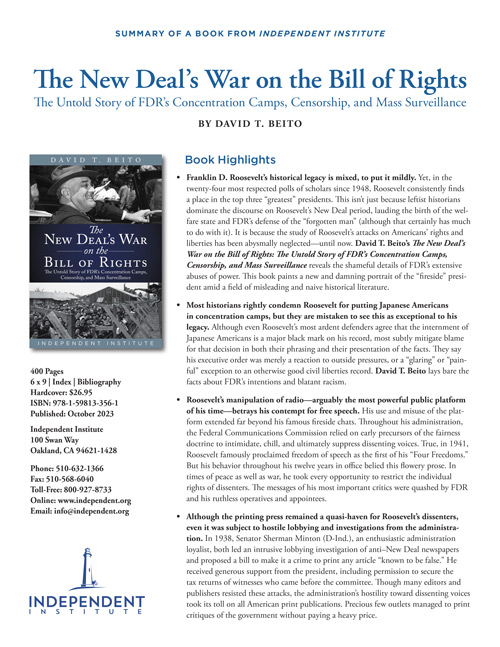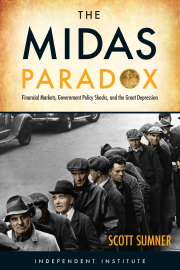| Price: | $26.95 |
| Price: | $26.95 |
Overview
“This book is not mere history; it is an exposé. You won’t know which is more shocking: the lengths to which FDR and New Dealers like Senators (and future Supreme Court justices) Hugo Black and Sherman Minton went to suppress freedom of speech, privacy, and civil rights; or the degree to which these efforts have been concealed by pro-FDR and New Deal propagandists.”
—Randy E. Barnett, Patrick Hotung Professor of Constitutional Law, Georgetown University Law Center
Spying on citizens. Censoring critics. Imprisoning minorities. These are the acts of dictators, not American presidents....
Or are they?
The legacy of President Franklin D. Roosevelt enjoys regular acclaim from historians, politicians, and educators. Lauded for his New Deal policies, leadership as a wartime president, cozy fireside chats, and groundbreaking support of the “forgotten man,” FDR, we have been told, is worthy of the same praise as men like Washington, Jefferson, and Lincoln....
But is that true? Does the father of today’s welfare state really deserve such generous approbation? Or is there a dark side to this golden legacy?
The New Deal’s War on the Bill of Rights: The Untold Story of FDR’s Concentration Camps, Censorship, and Mass Surveillance unveils a much different portrait than the standard orthodoxy found in today’s historical studies.
Deploying an abundance of primary source evidence and well-reasoned arguments, historian and distinguished professor emeritus David T. Beito masterfully presents a complete account of the real Franklin D. Roosevelt: a man who abused power, violated human rights, targeted dissidents, and let his crude racism imprison American citizens merely for being of Japanese descent.
Read it, and discover how FDR:
- shamelessly censored critics of his administration, barred them from the public square, destroyed their careers, and even bankrupted them when possible;
- locked up Japanese-American citizens in concentration camps built on American soil;
- sowed the seeds of today’s out-of-control surveillance state;
- and much, much more...
Here is an all too rare portrait of a man who changed the course of American history ... not for the better.
Read it, and you’ll never view the fireside president the same again.
Contents
Introduction
- New Deal Mass Surveillance: The “Black Inquisition Committee”
- The Minton Committee: An Anti–Free Speech Bridge Too Far
- Senator Minton and Mayor Hague: The Dawn of a Left–Right Bill of Rights Coalition
- The Necessary First Stage: Radio and the Quashing of a Free Speech Medium
- A New Deal for Radio and a New Uniformity
- “A Most Complete Espionage Service”: Boss Crump Cracks Down on Dissent
- “Persons Whose Removal Is Necessary”: FDR’s Concentration Camps
- A “Good War” for Free Speech?
- The Forgotten Sedition-Trial Fiasco
Conclusion
Notes
Selected Bibliography
Index
About the Author
Detailed Summary
- Franklin D. Roosevelt’s historical legacy is mixed, to put it mildly. Yet, in the twenty-four most respected polls of scholars since 1948, Roosevelt consistently finds a place in the top three “greatest” presidents. This isn’t just because leftist historians dominate the discourse on Roosevelt’s New Deal period, lauding the birth of the welfare state and FDR’s defense of the “forgotten man” (although that certainly has much to do with it). It is because the study of Roosevelt’s attacks on Americans’ rights and liberties has been abysmally neglected—until now. David T. Beito’s The New Deal’s War on the Bill of Rights: The Untold Story of FDR’s Concentration Camps, Censorship, and Mass Surveillance reveals the shameful details of FDR’s extensive abuses of power. This book paints a new and damning portrait of the “fireside” president amid a field of misleading and naive historical literature.
- Most historians rightly condemn Roosevelt for putting Japanese Americans in concentration camps, but they are mistaken to see this as exceptional to his legacy. Although even Roosevelt’s most ardent defenders agree that the internment of Japanese Americans is a major black mark on his record, most subtly mitigate blame for that decision in both their phrasing and their presentation of the facts. They say his executive order was merely a reaction to outside pressures, or a “glaring” or “painful” exception to an otherwise good civil liberties record. David T. Beito lays bare the facts about FDR’s intentions and blatant racism.
- Roosevelt’s manipulation of radio—arguably the most powerful public platform of his time—betrays his contempt for free speech. His use and misuse of the platform extended far beyond his famous fireside chats. Throughout his administration, the Federal Communications Commission relied on early precursors of the fairness doctrine to intimidate, chill, and ultimately suppress dissenting voices. True, in 1941, Roosevelt famously proclaimed freedom of speech as the first of his “Four Freedoms.” But his behavior throughout his twelve years in office belied this flowery prose. In times of peace as well as war, he took every opportunity to restrict the individual rights of dissenters. The messages of his most important critics were quashed by FDR and his ruthless operatives and appointees.
- Although the printing press remained a quasi-haven for Roosevelt’s dissenters, even it was subject to hostile lobbying and investigations from the administration. In 1938, Senator Sherman Minton (D-Ind.), an enthusiastic administration loyalist, both led an intrusive lobbying investigation of anti–New Deal newspapers and proposed a bill to make it a crime to print any article “known to be false.” He received generous support from the president, including permission to secure the tax returns of witnesses who came before the committee. Though many editors and publishers resisted these attacks, the administration’s hostility toward dissenting voices took its toll on all American print publications. Precious few outlets managed to print critiques of the government without paying a heavy price.
- Roosevelt’s attempts to surveil American citizens were unprecedented, aggressive, and unethical. Most Americans consider the birth of the “surveillance state” to be sometime after 9/11, with the passage of the Patriot Act and the establishment of the Transportation Security Administration (TSA). David T. Beito unveils its even deeper—and more sinister—roots. If you really want to know when the government started throwing your right to privacy out the window, then the establishment of the US Senate Special Committee to Investigate Lobbying Activities—also known as the Black Committee, after its chair, Senator Hugh L. Black (D-Ala.)—would be a good place to start. Though rarely remarked upon by today’s historians, this committee monitored private communications on a scale previously unrivaled in US history. Working in tandem with the Federal Communications Commission and the Roosevelt administration, the committee examined literally millions of private telegrams with virtually no supervision or constraint. The targets of this surveillance? None other than Roosevelt’s political opponents—primarily anti–New Deal critics, activists, journalists, and lawyers. So began the modern practice of mass surveillance.
The reputation of FDR, lauded for his New Deal policies and leadership as a wartime president, enjoys regular acclaim. In his own time too, Roosevelt was described as a comforting and competent hero who authored the “Four Freedoms,” wrote the Fair Employment Act, and helped America’s “forgotten man” with groundbreaking welfare programs. Indeed, in the twenty-four most respected polls of scholars since 1948, Roosevelt consistently finds a place in the top three “greatest” presidents.
And yet, critical thinkers must ask: Are historians wearing rose-colored glasses? Is the father of today’s welfare state really worthy of such generous approbation? How much of this glowing reputation is fact, and how much of it fiction? Does he deserve to rank among the greatest presidents America has ever had, next to men like Lincoln and Washington?
Even the most adoring Roosevelt historians agree that the internment of Japanese Americans was a major black mark on his record. But most subtly mitigate blame for that decision in their phrasing and presentation of facts, saying his executive order was a reaction to outside pressures or a “glaring” or “painful” exception to an otherwise good civil liberties record. These assertions are naive to the point of deceit— as the historical facts demonstrate.
In The New Deal’s War on the Bill of Rights: The Untold Story of FDR’s Concentration Camps, Censorship, and Mass Surveillance, historian and distinguished professor emeritus David T. Beito unveils the many abuses of power and human rights violations that defined Roosevelt’s time in office. The New Deal’s War on the Bill of Rights offers much-needed sobriety to the historical literature surrounding FDR, bringing the dark side of his administration to light.
Concentration Camps
Roosevelt’s internment of Japanese Americans stands as a glaring exception in the historical literature’s general neglect of his civil liberties record. No other single deprivation of the Bill of Rights has generated more books and articles. Of course, this attention is merited if measured by the standard of proportionality. In one fell swoop, the federal government snatched away the First through Ninth Amendment protections from some 120,000 men, women, and children, two-thirds of them American citizens.
But whether through ignorance or deceit, historians omit the scope of Roosevelt’s knowledge and intent in this grave matter. FDR himself characterized the incarceration of Japanese immigrants and Japanese American citizens as “concentration camps.” Furthermore, the historical evidence shows that Roosevelt had long considered Japanese Americans to be a suspect group—indeed, private records reveal he considered the Japanese as a whole to be markedly inferior. To cite but one example, as a columnist for the Macon (Ga.) Telegraph, in the 1920s, the future president elaborated on his views on Japanese immigration, writing that “anyone who has travelled in the Far East knows that the mingling of Asiatic blood with European or American blood produces, in nine cases out of ten, the most unfortunate results.” Though he rarely articulated these views so openly as president, his actions and policies betrayed this underlying contempt.
After Pearl Harbor, FDR made sure federal officials attempted to fire up rather than cool down hostile feelings toward the Japanese. In 1942, Executive Order 9066 resulted in mass Japanese American incarceration; that same year, Executive Order 9102 established the War Relocation Authority, to provide for the “removal from designated areas of persons whose removal is necessary in the interests of national security.” The overwhelming majority of Japanese incarcerated cooperated fully, but the WRA and the military did not hesitate to use force for those who did not. Rules in the concentration camps were extensive, including one that mandated all inmates to stay at least ten feet from the fence. When all was said and done, soldiers shot and killed seven unarmed inmates—mostly for failure, either real or perceived, to obey often trivial instructions such as walking on a paved sidewalk. By August, nearly all Japanese Americans on the West Coast were inmates in concentration camps, each characterized by guard towers and armed military patrols.
Censorship
Roosevelt’s fireside chats remain one of the most important aspects of his legacy. No other president depended more on the radio for the success of his administration. His chats and other speeches over the airwaves were instrumental in both selling the New Deal and protecting it. But Roosevelt’s administration owed its success not only to what FDR said over radio, but also to what others did not—or, rather, could not—say. Roosevelt had few scruples about schemes to covertly sideline, or even quash, dissenting radio voices. He was the master of behind-the-scenes intrigue, usually via private sector or governmental intermediaries.
The day after Roosevelt took office, the networks and the National Association of Broadcasters (NAB) jointly announced that all broadcasting facilities were on “an instant’s notice” at the service of the administration. Indeed, one of FDR’s top allies was Henry A. Bellows, then the CBS vice president and a former member of the Federal Radio Commission (predecessor to the Federal Communications Commission or FCC). Bellows, a Harvard classmate of FDR’s, promised to reject any broadcast over the network “that in any way was critical of any policy of the Administration.” He elaborated that all stations were “at the disposal of President Roosevelt and his administration.” He specified that CBS had a duty to support Roosevelt, right or wrong, and privately assured presidential press secretary Stephen Early that “the close contact between you and the broadcasters has tremendous possibilities of value to the administration, and as a life-long Democrat, I want to pledge my best efforts in making this cooperation successful.”
But Bellows was just one of many Roosevelt allies in the censorship effort. Friends of the administration in the Department of the Treasury, the State Department, and the National Association of Broadcasters (NAB) were all eager to play ball with the administration. Prominent dissenting voices on radio, including Boake Carter and the controversial Father Coughlin, were decisively silenced by these groups, all of which were acting as arms of the Roosevelt administration. Indeed, the putatively voluntary “voluntary code” adopted by the NAB banned the sale of commercial time to discussions of “controversial issues”—i.e., any opinions deviating from those of the administration. The code was enforced by the Code Compliance Committee and the FCC, ensuring rigid compliance from all practical-minded broadcasters not keen to earn the ire of the White House. It became the precursor of the FCC’s Mayflower doctrine of 1941, the most tangible expression of FCC content control and censorship.
Through these means, the Roosevelt administration set the precedent for the flagrant gatekeeping of American debate and discourse. If politicians and bureaucrats in our own time employ similar strategies, we know who paved their way.
Mass Surveillance
Most Americans trace the birth of the “surveillance state” to the Patriot Act, passed in the wake of a terrified post-9/11 America. But David T. Beito contends it was the Roosevelt administration that ushered in a surveillance state the likes of which Americans had never seen.
When a rapid succession of setbacks to Roosevelt’s New Deal took place in the spring and summer of 1935, Senator Hugo L. Black (D-Ala.) took the lead in probing the opposition campaign. Black was a New Deal zealot. Roosevelt gladly gave Black all the power he asked for, and his trust in Black’s judgment was steadfast. Emboldened by this support, Black used a combination of special subpoenas and a highly elastic contempt power to bewilder, harass, and intimidate enemies of the New Deal. Black also asked the US Bureau of Internal Revenue to issue a “general blanket order” for access to the tax returns of his witnesses.
But that wasn’t all. Black also forced telegraph companies to allow his committee to search all incoming and outgoing telegrams sent through Washington, DC. This was unprecedented government surveillance with almost no restrictions. More shocking still, because the committee had directed the subpoena to the telegraph companies, most targets found out—if they found out at all—that their correspondence was being tracked only during their hearing.
When this came to light, American outrage was at an all-time high. The anti–New Deal Chicago Daily Tribune called Black’s committee “terroristic.” Even the establishment publication Washington Post declared that “when private messages are indiscriminately exposed to official scrutiny without the consent of the sender,” this threatens representative government. But the damage was done. In a three-month period, staffers dug through great stacks of telegrams by company employees, lobbyists, newspaper publishers, political activists, and every member of Congress. This was remarkable by 1935 standards, and it remains remarkable today. Some estimate that the committee had examined some five million telegrams during its investigation.
In 2023, this would be akin to staffers’ forming a congressional committee and then joining the FCC at the headquarters of Google and Microsoft to spend months secretly searching all emails for specific names or organizations based on political references.
Despite all this, historians have consistently ignored Roosevelt’s many abuses—until now. David T. Beito challenges the standard orthodoxies surrounding FDR’s presidency, determinedly unveiling the dark side of the fireside president’s legacy. How America views the New Deal and its chief architect—and his chief minions—will never be the same.
Praise
“What Is the New Deal with the New Deal? Little about the book could be criticized directly, so look for progressive liberals to ignore it, as they tend to do with all well-written and -researched books that threaten statist status quo narratives.” Book Review by Robert E. Wright for AIER, Aug. 29, 2023.
“This book is not mere history; it is an exposé. You won't know which is more shocking: the lengths to which FDR and New Dealers like Senators (and future Supreme Court justices) Hugo Black and Sherman Minton went to suppress freedom of speech, privacy, and civil rights; or the degree to which these efforts have been concealed by pro-FDR and New Deal propagandists. While the repressive measures taken by FDR and his New Dealers against their political opponents resemble tactics favored by progressives today, Beito shows that the ‘good old days’ were in some respects even worse. But he also usefully reminds us that resistance to these measures was bipartisan. This is a story that all Americans should know—especially anyone who is headed to college or law school. I will be strongly recommending it to the students in my class on constitutional rights and liberties.”
—Randy E. Barnett, Patrick Hotung Professor of Constitutional Law, Georgetown University Law Center; faculty director, Georgetown Center for the Constitution
“All historians who have written about Franklin Roosevelt need to read David Beito’s book and, in almost all cases, revise what they said. The New Deal’s War on the Bill of Rights illuminates Roosevelt’s desire for power and his efforts to punish those who tried to thwart him.”
—Burt Folsom, professor of history emeritus, Hillsdale College; author of New Deal or Raw Deal?
“For all his accomplishments, Franklin Delano Roosevelt had little tolerance for critics and not much respect for the Bill of Rights. David T. Beito’s useful survey of the partially unknown dark side of the New Deal reveals the surprising variety of repressive measures that FDR and his supporters employed—not always successfully—to quash those who opposed his administration. It’s a sobering story that reminds us of how precarious our civil liberties have always been.”
—Ellen Schrecker, professor emerita, Yeshiva University; author of Many Are the Crimes: McCarthyism in America
“This book is exhaustively researched and often insightful, and it has some timeless historical lessons for Americans who value civil liberties and privacy. Beito reveals a dark side of the FDR administration that historians have generally ignored.”
—David Boaz, distinguished senior fellow, Cato Institute; author of The Libertarian Mind
“In this important book, David Beito shines new light on the civil liberties record of President Franklin D. Roosevelt. Beyond the internment of Japanese Americans, Beito skillfully documents how FDR undermined free speech through extensive state censorship and surveillance. This well-written book not only clarifies the historical record, but also offers crucial insights into the foundations of contemporary government activities which continue to threaten the civil liberties of Americans. Anyone interested in civil liberties and government overreach should read this book!”
—Christopher Coyne, professor of economics, George Mason University
“Long a critic of FDR, I was nonetheless stunned and riveted by what David Beito reveals in this book. That an American president would so callously shred the Bill of Rights is a damning indictment—not just of FDR, but of his enablers in the media and academia who covered it all up for decades. Hereafter, no assessment of the 32nd president can be honest or thorough without factoring in Beito’s indispensable contribution to the history of the office.”
—Lawrence W. Reed, president emeritus, Foundation for Economic Education
“In an age when Americans are critically re-examining our history, New Deal abuses of power and authority are still downplayed and ignored by historians enamored with FDR and the rise of an activist federal government. David Beito’s well-written, well-documented book brings those abuses to light, showing that the rise of federal power in the 1930s was accompanied by massive violations of Americans’ civil liberties.”
—David E. Bernstein, University Professor, Antonin Scalia Law School, George Mason University
“This is a tour de force capturing the all-encompassing threat Franklin Roosevelt and the New Deal posed to American freedoms. Beito opens our eyes to the wiretapping of political enemies, seizure of private telegrams, violation of tax return privacy, congressional witch hunts, a purge of conservative radio spokesmen, the internment of Japanese Americans, and much more. In eerie parallels to the Left’s current obsession with banishing ‘disinformation,’ New Dealers also sought to criminalize ‘false news.’ You will not view FDR and the New Deal in the same way after finishing this important work.”
—Jonathan Bean, professor of history, Southern Illinois University; author of Race and Liberty in America: The Essential Reader
“You wouldn’t guess it from the soaring rhetoric of his Four Freedoms speech, but Franklin Roosevelt has a rotten record on civil liberties. David Beito’s illuminating book explores the censorship, the spying, and the internment camps of the FDR years, as well as the uncomfortable intersection between the New Deal and Jim Crow.”
—Jesse Walker, books editor, Reason; author of Rebels on the Air: An Alternative History of Radio in America and The United States of Paranoia: A Conspiracy Theory
Awards
Amazon.com
- #1 New Release in Civil Rights and Liberties
















